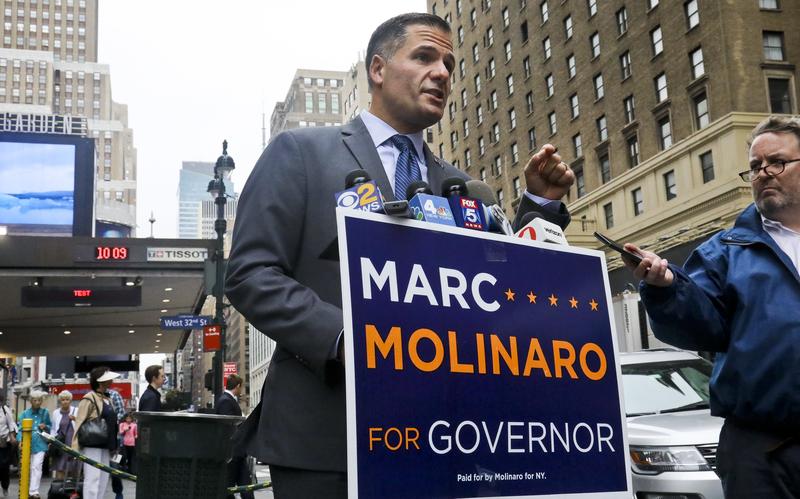
From a distance, it’s a garden-variety lapel pin — maybe a United States flag, or maybe another insignia dominated by Republican red.
Up close, though, it’s the cartoon character Underdog, famed for heroic rescues and cameo appearances at the Macy’s Thanksgiving Day Parade.
For Republican challenger Mark Molinaro, his Underdog pin is a tongue-in-cheek reminder of his political mission these days: defeating the much better known, and much better financed, two-term incumbent Gov. Andrew Cuomo.
“I am by every definition an underdog,” he said with a laugh. “I think that America has been defined and redefined by underdogs, and the pin just reminds me of the role that I have, the fight that I have, and the people I have to work for.”
And as Molinaro's children remind him: the slapstick super-dog always triumphs against the odds.
In about three weeks, the 43-year-old Dutchess County Executive will find out how this episode ends. At the moment, things are a little bleak.
In the latest campaign filing, Molinaro had $210,00 cash on hand. Cuomo had $9.2 million, or 43 times as much. One Republican strategist told the New York Times that GOP donors think investing in Molinaro is a waste of money, because Cuomo’s decisive primary victory over Cynthia Nixon last month suggested he’s basically unbeatable.
“He’s not ready, but he’s smart enough to try,” said Rosalie Russo, a Molinaro admirer and resident of Tivoli, his political home town. “That gets his name out. He can have it next time.”
Molinaro insisted he could sway Russo to vote for him, and said he wasn't running just to lift his stature but to unseat Cuomo and improve state government.
He told WNYC his goals are to “lower property taxes, focus on deregulation for small businesses, families and farmers, and really invest in the things that make a difference in people's lives.”
And most of all, he said, he wants to end the pay-to-play culture of New York that has led to the criminal convictions of two top Cuomo aides, Joe Percoco and Alain Kaloyeros.
Molinaro said he would limit campaign donations from people with business before the state and institute other reforms to hinder political favors.
“We’re going to send corruption out the door,” he said.
Cuomo has fired back that Molinaro's broadsides are like the pot calling the kettle black, because Molinaro has accepted large campaign contributions from donors with multi-million-dollar contracts in Dutchess County. Democrats on the Board of Legislators have asked the county Board of Ethics, the Attorney General and the state’s Joint Commission on Public Ethics to look into the hiring of Molinaro’s wife by a local design and development firm.
“If you add it all up, it's $330,000 that Marcus has accepted from 72 companies that have gotten $89 million of our money in county contracts,” said county legislator Joel Tyner, a Democrat. “Cuomo’s not perfect. He has conflict-of-interest issues, too. But they’re really two peas of a pod.”
Molinaro strenuously denied that campaign contributions have affected county contracts.
“Individuals who get contracts get them through a competitive process,” he said. “And should they wish to make contributions, they do — to both Republicans and Democrats.”
Tyner and others have tried to get Dutchess County to pass campaign donation limits like those in nearby Orange and Rockland counties. Molinaro opposed the bills, arguing that only Albany had the authority to impose such limits.
And that’s another reason, he said, for voters to send him there.
“When I’m governor, we're going to pass the most significant campaign finance reforms this state has ever seen to dry up what is a corrupted system,” Molinaro said.
In the primaries, Cynthia Nixon similarly attacked Cuomo's spotty track record on ethics and campaign finance. She didn’t get much traction. Democrats were largely willing to look the other way at the succession of scandals over the past eight years in favor of what were perceived to Cuomo's policy accomplishments and fiscal stewardship.
Even in Tivoli, where Molinaro made national headlines for becoming “the youngest mayor in the country” at age 19, many people who enthusiastically admire him say it would be difficult to vote Republican, especially with Donald Trump in the White House.
“I’m probably going to vote for Cuomo,” says Dan Dudley, a local builder and carpenter. “And I’m not doing it because he’s a charming guy.”
Even Justin Tedaldi — who played little league baseball when Molinaro was a coach — said he couldn't see crossing party lines.
“I would vote for him,” he said. “However, I'm a Democrat so I'm not going to vote for the opposing party.”
Molinaro maintained that he’s a moderate and that “party label is the least important part of who I am.” He didn’t vote for Donald Trump. He supports much of the Affordable Care Act, and he opposes parts of the federal tax overhaul, especially new limits to state and local tax deductions.
But getting his message out has been difficult.
One online commercial tries to inspire voters by recounting the parable of 1994, when “a little known state senator, who started his political career as mayor of a small Hudson Valley village, took on a David-and-Goliath match-up against a well-known New York governor.”
It’s the story of George Pataki, who with little money and long odds, defeated three-term incumbent governor Mario Cuomo. In the ad — which doesn't mention the crucial role played by the GOP machine of former U.S. Sen. Al D'Amato — Pataki urges New Yorkers to vote for Molinaro.
“Just like in 1994,” he says over a soaring soundtrack of synthesized strings, “2018 presents us with an opportunity to again stun the political establishment.”
As of mid-October, however, only 1,177 people had viewed the ad on YouTube.

